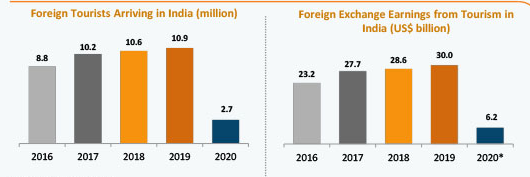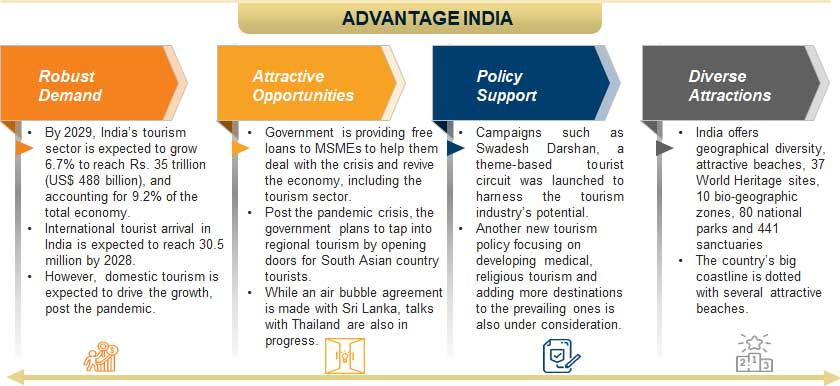Domestic Tourism Opportunity
This article is based on A domestic tourism opportunity has presented itself. India must seize it which was published in the Hindustan Times on 17/09/2021. It talks about the tourism sector, constraints associated with it and suggests a way forward.
Over the last 20 years, the world has faced many global adversities — the dot-com bubble, the 9/11 attack, the 2008 financial meltdown, among others. Covid-19 is another disruption caused by a macro-event, but its intensity is far more severe.
Like all challenging situations, this pandemic-induced crisis has also presented us with an opportunity to recalibrate the tourism potential. But this needs political will, the entrepreneurial spirit of the private sector, and investment support.
Significance of Tourism Sector
- Generates Income and Employment: In 2020, the Indian tourism sector accounted for 31.8 million jobs, which was 7.3% of the total employment in the country.
- By 2029, it is expected to account for about 53 million jobs.
- Service Sector: It gives a push to the service sector. A large number of businesses engaged in the service sector such as airlines, hotels, surface transportation, etc. grows with the growth of the tourism industry.
- Foreign Travelers help India in getting net Foreign Exchange.
- Tourism helps in preservation of National Heritage and Environment by bringing in focus the importance of sites and the need to preserve them.
- Tourism as a form of soft power, helps in promoting cultural diplomacy, people to people connect and thereby promotes friendship and cooperation between India and other countries.
Constraints in Tourism Sector
- Infrastructure and Connectivity: Deficiencies in infrastructure and inadequate connectivity hamper tourist visits to some heritage sites.
- Also, India has various tourist destinations but few circuits or segments such as the Golden Triangle (Delhi-Agra-Jaipur).
- Promotion and Marketing: Although it has been increasing, online marketing/branding remains limited and campaigns are not coordinated.
- Tourist information centers are poorly managed, making it difficult for domestic and foreign tourists to access information with ease.
- Lack of Skills: The number of adequately trained individuals for the tourism and hospitality sector is a key challenge to giving visitors a world-class experience.
- A limited number of multilingual trained guides, and the limited local awareness and understanding of the benefits and responsibilities associated with tourist growth act as constraints on the sector’s growth.
- Underutilization of Tourism Potential: Out of 140 countries, India ranked 8th on cultural resources and business travel, 13th on price competitiveness, and 14th on natural resources in World Economic Forum’s Travel & Tourism Competitiveness Report 2019.
- Despite these superb rankings, India’s overall tourism competitiveness ranking at 34 reveals that India has not monetized or marketed the precious assets embedded in its heritage to their full potential, as other countries do.
Way Forward
- A Robust Transportation Network: Travel and tourism heavily depend on a robust transportation network operated on-road, railways, and air.
- There is still a lot of ground to cover to improve last-mile connectivity.
- In the railways, the traffic has been stagnant.
- The railways need radical reforms — initiating the proposal to attract private investment in passenger train service is a humble beginning by the government, but wide-ranging reforms are the need of the hour.
- On air travel, focus on solving for better connectivity, especially for less explored tourism in the Northeast. Currently, less than 50% of the total routes under the UDAN scheme are operational.
- It is critical to make these routes operational and viable for airlines so that hidden gems such as Zuluk in Sikkim, Ziro in Arunachal, Majuli in Assam have better connectivity through commercial flights, helicopters and air taxis.
- Upgrading the Capacity of Infrastructure: There is a pressing need to upgrade capacity at top tourist locations..
- India’s top travel destinations are crumbling due to the high influx of tourists and poor infrastructural support.
- Water scarcity and infra issues in Shimla are well known, and this time, in between the two Covid-19 waves.
- Before the pandemic, around 26 million Indians travelled abroad in 2018, spending an estimated USD 25 billion.
- Thus, there is a need to remove the infrastructural bottlenecks.
- Exploring the unexplored: We also need to create awareness of numerous undiscovered places in India. The tourism ministry has made a strong push with ‘Dekho Apna Desh Campaign’, but the government and private sector can collaborate towards the development of campaigns that will promote domestic travel in line with evolving travel preferences.
- For the holistic development of the sector, identifying, developing and spreading awareness about unexplored travel destinations within India to ease the burden on overexposed popular locations which see more than 90% share of tourist footfall during the peak travel season.
- Incentives and concessions: With a belief that the travel and tourism sector will continue to contribute significantly to the country’s Gross Domestic Product (GDP) and employment generation, as was done in the past, it is an opportune moment for timely push with concessions and incentivisation to grow domestic tourism.
- Recently, the ministry of tourism initiated a proposal for the inclusion of tourism in the concurrent list of the Constitution. This move will allow both the Centre and states to formulate policies that could benefit the sector.
- The move could particularly benefit the industry as it could lead to the rationalisation of property and other taxes, industry status across the board, as well as lower rates on electricity and water.
Conclusion
Given opportunities in the Tourism sector, it can act as an engine to revive growth and showcase brand India to the world.
|
Drishti Mains Question Covid-19 pandemic-induced crisis has also presented us with an opportunity to recalibrate the tourism potential. Comment. |


